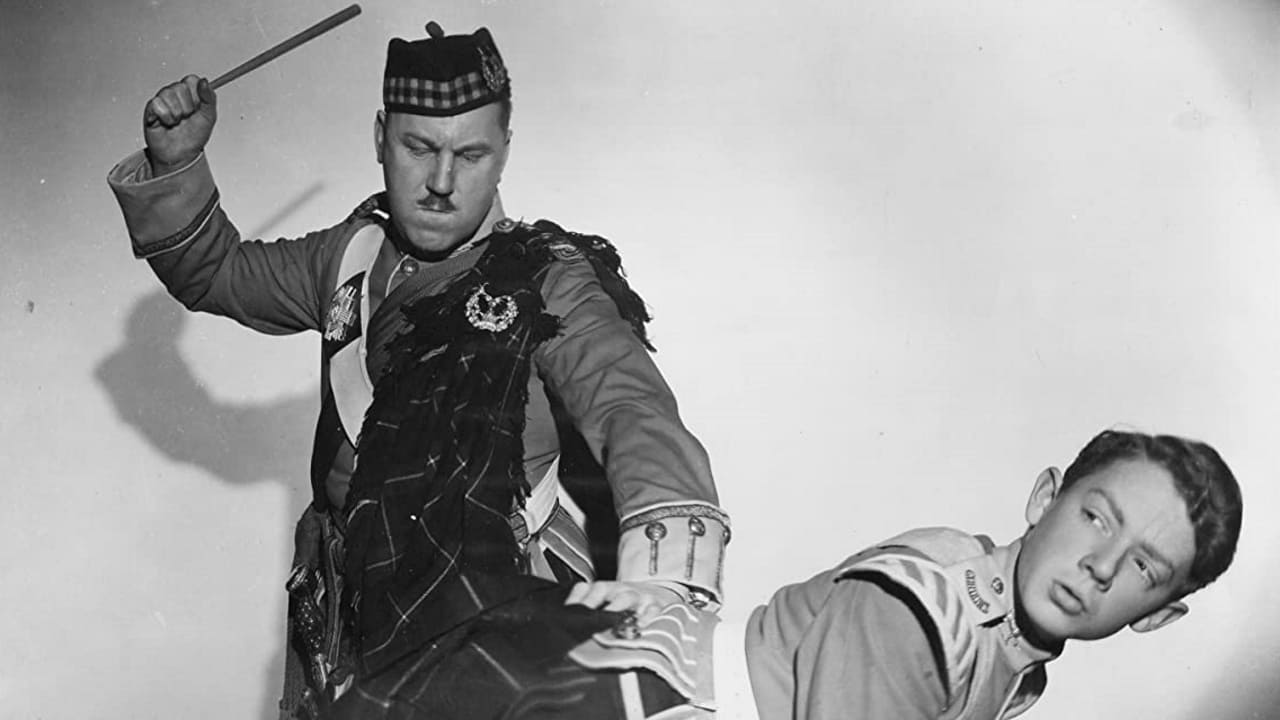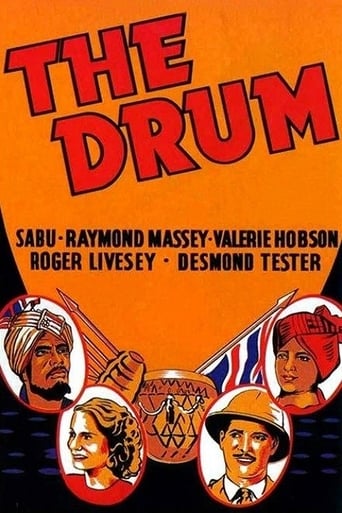Exoticalot
People are voting emotionally.
Hadrina
The movie's neither hopeful in contrived ways, nor hopeless in different contrived ways. Somehow it manages to be wonderful
Tayloriona
Although I seem to have had higher expectations than I thought, the movie is super entertaining.
Adeel Hail
Unshakable, witty and deeply felt, the film will be paying emotional dividends for a long, long time.
bkoganbing
AEW Mason who is best known for writing Four Feathers which has been filmed several times going back to the silent screen wrote the story for Drums. It's set in a more modern time between the two World Wars era of the British Raj. Seen today it is quite an anachronism.Not everyone in India bought Mahatma Gandhi's policy of peaceful non-resistance to British rule. Some like Raymond Massey playing a usurping uncle like Richard III believed in war. Trouble is he's only an uncle, brother to the ruler of his local satrapy and uncle to the Crown Prince played by Sabu. In fact Massey has been plotting for years quietly importing arms and lining up support. He kills his brother, but unfortunately doesn't get Sabu who seeks refuge with the British governor general Francis L. Sullivan. It's the next step for Massey that he hopes will rally the native Indians to his side. He has plans to massacre a troop of British soldiers, Scot's Highlanders to be precise and among the folks there are Sabu's friends Roger Livey and wife Valerie Hobson and a drummer boy Desmond Tester whom he's befriended. What happens here is a slam bang action scene very well staged by Alexander Korda and brother director Zoltan Korda.These two Hungarians who were the backbone of the British cinema never missed an opportunity cinematically to salute the virtues of the British Empire. In some quarters Massey might be considered a hero in what he's doing.In fact the British never outrightly ruled India with the troops they had there. What they did is play off the various religious factions, Hindu, Moslem, Parsee, Sikh, Jain etc. and the various rulers of the hundreds of little kingdoms that were within India after the last Mogul Emperor died. Military advice and supplies and trade did the trick for them for a couple of hundred years. What you see in Sabu's relationship with the British is quite true and you can see that in many other films like The Rains Came which was made in the USA.This was an expensive product for the British cinema. In the Thirties color was even more rarely used than in the USA yet the Kordas sprung for it. And they did a remarkable job in making location shooting in Wales look like India. The print I saw could have used a restoration and hopefully it has been done or will be done.Drums is anachronistic for today's audience both in India and in the west. But it is history if slanted Kipling like history.
Leofwine_draca
...nevertheless I ended up greatly enjoying THE DRUM! Conceived as a vehicle to cash in on the popularity of child star Sabu (who'd just appeared in ELEPHANT BOY), THE DRUM is a film which fondly reminisces over the glory days of the British Empire. The film is set in the Northwest Frontier of India in the dying days of the Raj, where the occupying Brit troops are stiff-upper-lip possessing heroes and the Indians are divided into loyal subjects and dastardly moustache-twirling villains.Into this mix is thrown Sabu, playing a slightly conceited but nonetheless loyal young prince, whose friendship with a youthful red-headed drummer leads to plenty of laughs. The plot begins aproper when the dastardly Prince Ghul (Raymond Massey) decides to lead an uprising against the just Captain Carruthers (Roger Livesey, the epitome of the kindly British gentleman).Director Zoltan Korda possesses the ability to make his film look great, full of gung-ho battle scenes and convincing depictions of British colonialism - although the film was actually shot in Wales and most of the Indian characters are Brits in blackface! Still, Valerie Hobson is breathlessly beautiful as Carruther's sensitive wife, there's a pleasing hard edge to the violence (with severed heads tossed through windows and bloodshed) and a great climax which gives the film its title. They sure don't make 'em like this anymore!
JoeytheBrit
All is not well on the Northwest Frontier: the dastardly Prince Ghul (Raymond Massey) has assassinated the ruling king so that he can take his kingdom back from the British with the aid of machine guns smuggled in from Afghanistan. To escape the same fate as his father, Prince Azim (Sabu) assumes the identity of a lowly peasant as he tries to warn Captain Carruthers (Roger Livesey) of the danger that awaits him and his men.The Drum is one of those old school British films that glorified our former position as Empire builders by painting us as benign masters deeply concerned about the well-being of those whom we had colonised. The redoubtable Roger Livesey is the embodiment of stiff upper lippery as he strives to foil the skulduggery of the evil Ghul - a wonderfully malign performance from a black-faced Raymond Massey - and return Azim to his rightful place on the throne of Tokot. Livesey wasn't really well-suited to the dashing hero type, although he was the epitome of the British colonial officer. Although he was only in his mid-thirties when he made this film, he looks much older, as if he'd be more at home over a fat cigar and a glass of port in the study than battling fuzzy-wuzzies in the searing heat. Valerie Hobson plays his devoted wife with that glacial air reserved for the wives of officers or upper-class businessmen in pre-WWII Brit flicks, and it's impossible to imagine her locked in a passionate embrace with her husband. In fact that is probably where the biggest problem with this film lies: there's very little passion for anything evident in any of the characters: they are simply facing - or creating - one problem after another and stoically devising ways of dealing with them.The plot is fairly stodgy by today's standards. There's a lot of talk and precious little action until the last reel or two, which means many people will find it hard going. Suffice to say, the equilibrium is restored by the final reel and our Colonial subjects are left to live peaceful lives beneath our benign and ever-watchful gaze.
Igenlode Wordsmith
From 'Kim' to 'Carry On up the Khyber', from the famous to the infamous (stand up, Harry Flashman!), the North-West Frontier has proved a fertile source of conflict both fictional and historical... and deposed rulers and fiery mullahs have figured largely from that day to this. The plot of 'The Drum' cribs heavily (and at one point openly, with an impudently-inserted piece of dialogue listing the historical parallels that had been niggling at me!) from real-life events, especially in Afghanistan, and as other stories before and since have been based on the same material, this can result in a certain 'seen-it-all-before' sensation. But the winning element in this film is the touch of humanity and humour which helps the characters to become more than cardboard templates, from the drummer-boy and his misfortunes to the wry jests of the newly-appointed British representative walking open-eyed into a trap. Not to mention that, after a spate of films with seemingly pointless titles, I found it obscurely satisfying to encounter one where the eponymous instrument is actually significant both to the plot and its climax!The always-excellent Sabu steals the film, as ever, in his role first as a self-possessed princeling and then as a fugitive in exile from his throne; the romantic leads, while well-performed, are less memorable. The tension in the banquet scene is tangible, and Raymond Massey as the usurper brings brains as well as menace to his role. The one element that rather shocked me -- with the exception of the inadvertent glimpse of buttock that reveals exactly what Scotsmen do or don't wear under their kilts! -- was the scene in which the said usurper is shot down by our wounded hero in cold blood, having thrown down his weapon. It's not customary for such an act to be depicted in an apparently approving manner; and certainly not in a film of this period...I must admit that the question of the period itself had me slightly puzzled, although the mention of syncopation in the drum part for the dance should have given me a clue. I had automatically assumed the story to be set in nineteenth-century India in the heyday of the Raj rather than the contemporary world, and with few European civilian fashions on display, there was nothing to disabuse me of this until the heroine made an appearance in jodhpurs, which came as something of a shock! (And the subconscious resonance with the valleys of 'Carry On up the Khyber' turns out to be based in fact: locations from both were shot in Wales...)But 'The Drum' is a rousing adventure as they used to make 'em, in the tradition of 'Charge of the Light Brigade' or 'Northwest Frontier'; if you like the genre, this one is a cracker.

